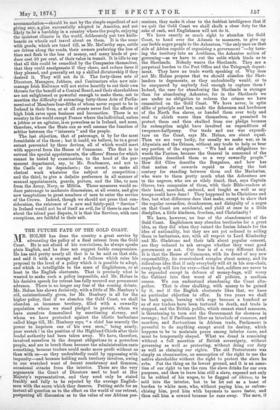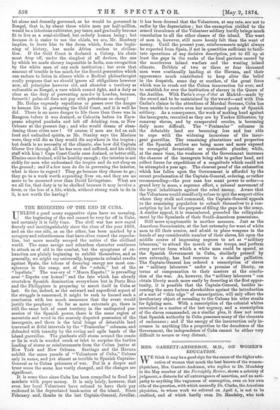THE FUTURE FATE OF THE GOLD COAST.
pdoofinoey oft hf ea cfionuna lt rrye t rae agtr efar from s etrhv eice Gold obl yd adv°oLcatiSng hthase
Coast. He is not afraid of his convictions, he always speaks plain English, and he does not suggest feeble compromises. He has said pretty nearly all that is to be said on that side, and said it with a courage and a fullness which raise his proposal to the level of a policy which it is possible to adopt, and which is intelligible to the mass of Englishmen, or at least to the English electorate. That is precisely what is wanted to make such a policy impossible, and Mr. Holms in his decisive speech for retreat has fully secured our permanent advance. There is no longer any fear of the coming debate. Mr. Holm lias shown decisively, with a little of Mr. Hanbury's aid, unintentionally given, for Mr. Hanbury is all for the higher policy, that if we abandon the Gold Coast, we shall abandon an immense territory, filled with a cowardly population whom we stand pledged to protect, whom we have ourselves demoralised by sanctioning slavery, and whom we have protected against the idiotic barbarians called kings till, Mr. Hanbury says, "a chief has scarcely the power to imprison one of his own men," being nearly, poor wretch ! in the position of the Highland Chiefs after their feudal authority had been taken away. We have, therefore, involved ourselves in the deepest obligations to a powerless people, and are to break them because the administration costs something, because traders could make more profit without us than with us—as they undoubtedly could by oppressing with impunity—and because holding such territory involves, owing to our wretched want of decent consistency and firmness, occasional attacks from the interior. Those are the very arguments the Court of Directors used to hurl at Her Majesty's representatives, and they need only be stated frankly and fully to be rejected by the average English- man with the scorn which they deserve. Putting aside for an instant all question as to the effect on the world of our retreat, postponing all discussion as to the value of our African pos- sessions, they make it clear to the feeblest intelligence that if we quit the Gold Coast we shall skulk a clear duty for the sake of cash, and Englishmen will not do it.
We have exactly as much right to abandon the Gold Coast, to hand over the Adansis to massacre, to give up our feeble negro people to the Ashantees, "the only race on that side of Africa capable of organising a government "—by turn- ing the territory into an Aeeldama, the Ashantee notion of governing—as we have to cut the cable which binds us to the Shetlands. Nobody wants the Shetlands. They are a perpetual burden to the Post Office and the Telegraph depart- ment. They have no trade worth speaking of. Why does not Mr. Holms propose that we should abandon the Shet- landers to degenerate, as they undoubtedly would, or to be conquered by anybody fool enough to capture them ? Indeed, the case for abandoning the Shetlands is stronger than for abandoning Ashantee, for in the Shetlands we are under no obligation to redeem the crimes we have committed on the Gold Coast. We have never, in spite alike of principle and law, made the fishermen and herdsmen of the North Sea slaves, or handed them over body and soul to chiefs worse than themselves, or promised to protect them and then skulked from our pledge because its redemption might have involved an expenditure of twopence-halfpenny. Our trade and our war expendi- ture on the Coast, says Mr. Holms, are about equal. Then we are very lucky, for usually we make war, as in Abyssinia and the Crimea, without any trade to help us bear any portion of the expenses. "We had no obligations to- wards the Fantees, because the General in command of the expedition described them as a very cowardly people." How did Clive describe the Bengalees, and how has that nation of cowards repaid us during the last century for standing between them and the Marhattas, who were to them pretty much what the Ashantees are to the negroes, who are so vilely timid, that, says Captain Glover, two companies of them, with their Bible-readers at their head, marched, endured, and fought as well as any troops could have done ? They happened to be Christians and free, but what difference does that make, except to show that the regular cowardice, drunkenness, and disloyalty of a negro on that Coast are accidental, and yield at once to a little discipline, a little kindness, freedom, and Christianity ?
We have, however, no fear of the abandonment of the Gold Coast. Englishmen may abandon territories for a great idea, as they did when they ruined the Ionian Islands for the idea of nationality, but they are not yet reduced to selling them to barbarians, nor, with all respect to Lord Kimberley and Mr. Gladstone and their talk about popular consent, are they reduced to ask savages whether they want good government or not. Our fear is of a very different kind. It is that the House of Commons, with its dread of any new responsibility, its overstrained scruples about money, and its ridiculous idea that if only everybody will sit in his arm-chair, everybody will live for ever—that in fact, soldiers are never to be expended except in defence of money-bags, will worry the Cabinet into that worst of all policies, a medium course. We can understand abandoning the Coast alto- gether. That is clear skulking, with money to be gained by it, and if the English electorate likes that, we have no particular objection to offer. In two years we shall be back again, burning with rage because a hundred or so of our traders have been tortured to death, and trade is stopped, and the British public, which cannot stand massacre, is threatening to turn out the Government for slowness in revenge ; but if Parliament likes an interlude of rumours, and murders, and fluctuations in African trade, Parliament is powerful to do anything except avoid its destiny, which happens to be to maintain peace among inferior races, and must be temporarily obeyed. What we dread is remaining without a full assertion of British sovereignty, without governing as well as protecting, without doing our duty as well as claiming our rights. The old Protectorate was simply an abomination, an assumption of the right to use the native slaveholder without the right to protect the slave he robs. Put the thing on its lowest ground, and it is an asser- tion of our right to tax the rum the slave drinks for our own purposes, and then to leave him still a slave, exposed not only to be robbed of his wages, to be flogged ad libitunz, to be sold into the interior, but to be let out as a beast of burden to white men, who, without paying him, or enfran- chising him, prod him with bayonets to move faster, and then call him a coward because he runs away. The men, if
let alone and decently governed, as he would be governed in Bengal, that is, by about three white men per half-million, would be a laborious cultivator, pay taxes, and gradually become fit to live as a semi-civilised, but orderly human being ; but because it is easier to use the chiefs, we are, Mr. Hanbury implies, to leave him to the doom which, from the begin- ning of history, has made Africa useless to civilisa- tion. If the Gold Coast is declared a Colony, his chain must drop off, under the simplest of all devices, the one by which we made slavery impossible in India, non-recognition by the white man of any such institution ; but even that amount of trouble is too much for the flaccid generation which can endure to listen in silence while a Radical philanthropist coolly proposes that we should ignore all obligations however new, all principles however old, and abandon a territory as culturable as Bengal, a race which cannot fight, and a duty as clear as the duty of preventing murder in London, because, forsooth 1 palm-oil does not pay with petroleum so cheap !
Mr. Helms expressly repudiates or passes over the danger to human life in governing the Gold Coast, and it is well he did. There is no more danger to life there than there was in Rangoon before it was drained, or Calcutta before its Euro- peans adopted punkahs and left off drinking rum, or New Orleans at the present day ; and who would dream of aban- doning those cities now ? Of course, if men are fed on salt food and unlimited spirits, as Mr. Stanley says the Marines were, they will die as they would die anywhere in the tropics ; but death is no necessity of the climate, else how did Captain Glover live through all he has seen and suffered, and his white staff with him ? Cape Coast Castle once drained, or better still, Elmina once drained, will be healthy enough ; the interior is not sickly for men who understand the tropics and do not sleep on the ground ; and if a few men do die in governing the interior, what is there to regret ? They go because they choose to go ; they go to a work worth expending lives on, and they are no more to be mourned over than David Livingstone. What are we all for, that duty is to be skulked because it may involve a fever, or the loss of a life, which, without strong work to do in it, is not worth the having ?



































 Previous page
Previous page